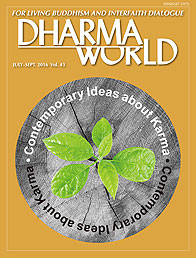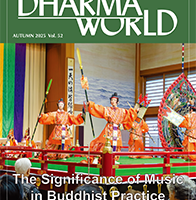July-September 2016, Volume 43(PDF)
Contemporary Ideas about Karma
Merriam-Webster’s Collegiate Dictionary defines karma as “the force generated by a person’s actions held in Hinduism and Buddhism to perpetuate transmigration and in its ethical consequences to determine the nature of the person’s next existence.” Karma is a fundamental Buddhist concept. Buddhists hold that wholesome deeds and intentions create beneficial karma, and unwholesome deeds and intentions create harmful karma.
The consequences of a person’s deeds might not be revealed in his or her present life, but only in subsequent lives. This is why some people might not seem to “reap what they sow.”
It is questionable whether all Buddhists have subscribed to the doctrines of rebirth and karma as elaborated above. Over time, ways of mitigating or reversing the effects of karma appeared in Buddhist traditions, and many contemporary Buddhists believe in transmigration but do not think their everyday behavior will affect their future lives. Some may even reject karma and rebirth as fatalistic justifications for prejudice, such as sexual discrimination, or for such misfortunes as poverty, physical disability, and natural disasters.
What is karma? How do people today understand it? We may need to rethink karma, an important Buddhist concept that has often been misinterpreted and exploited for various reasons, so that Buddhism will continue to be a spiritual guide for people’s thoughts and deeds.























































































